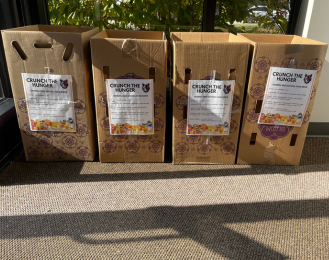At age fifteen, Okemos High School Sophomore Lahari Raja has taken part in food drives in each of her hometowns. Her most recent is the annual Crunch the Hunger Food Drive, which is entering its second year. Her experience stems from her participation in her middle school’s food drive in Troy, Michigan, leaving her with the knowledge to implement one after moving to the Greater Lansing area.
“I got to see what a difference one can of food makes. It left a huge mark on me and I think that’s what really got the gears moving,” Raja said. Raja reached out to her community, asking how she could give back with the support of her high school and food banks in the area.
“I started reaching out to my principal who was extremely excited and fully supported me throughout the process. From then on, I reached out to principals and the other schools in the district and some other community members, they also were super enthusiastic and fully embraced the idea. I think that all the staff, students and community members that I’ve gotten to work with so far have really made this process and food drive a huge success because they’re super enthusiastic and super excited about it too.” Raja said.
The Meridian Township Fire Department set up donation locations and teamed up with Lahari and Okemos High School to collect non-perishable goods around the holiday season. These goods are donated to the Greater Lansing Food Bank (GLFB), a foundation that has been working to fight food insecurity since 1981.

As the leader and head of the Crunch the Hunger Food Drive, Raja is responsible for brainstorming and setting up within the public schools in the area. Although she received help from her principal and other community members, Raja is really the driving force behind the entire food drive.
Daniel Kemsley, Okemos High School principal, acknowledged Raja’s role in the food drive and simply provided her guidance.
“I am constantly amazed by the wonderful things my students do. I’m thankful I get to work with them and my amazing staff daily,” Kemsley said, “we’re here for a very short time. I think part of being a good human is helping those in our community.”
Kemsley expressed his concern for food insecurity in the Greater Lansing area and how the pandemic helped illuminate the issue in his community. Approximately, 1 in 8 Michigan residents are experiencing food insecurity, and the GLFB has seen a 35% increase in residents who are reaching out for help.
The Midwest ranked second in highest food insecurity rates in 2022. On average, 11.9% of Michigan households went without food last year due to financial concerns according to the U.S. Department of Agriculture. Greater Lansing Food Bank’s Corporate and Community Giving Specialist Brady Broderick shared professional insight on the issue.
“This year Greater Lansing Food Bank will distribute 12 million pounds of food, and that’s going to be our biggest year to date,” said Broderick.
Although a small percentage of that total comes from food drives, Broderick shared that food drives help advocate for the cause and bring attention to the issue.
“Any time of the year is a great time to put on a food drive or a fundraiser, and there’s definitely opportunities throughout the year to do that work as well,” said Broderick, “If people participate in the food drive during the holiday season and they want to do more or to learn more, I encourage them to get connected with GLFB.”
Almost all food drives struggle with gaining traction across the community, but there are many ways to help outside of donating. Local food pantries accept extra produce from community members who grow their own, and GLFB has a volunteer portal that connects you with volunteering opportunities. “I think the number one thing that anybody can do is spread the word, whether that be by mouth or online. You know, the only way that we’re able to reach a lot of people is by spreading the word, and I know that not everybody’s always in a place to donate, but just sending the text or sharing it with other people can kind of create a chain of awareness and strength.” Raja said.
Local donor and MSU student Iris Kerr cleared her pantry when she heard about the food drive in her community.
“I know how hard the holidays can be for people, I give back what I can when I can,” said Kerr.
Donating food not only helps the people receiving it but reduces food waste. In 2019, the EPA estimated that about 66 million tons of food went to waste in the United States alone.
“Honestly, I feel like as an individual, we all have a responsibility to better ourselves and better those around us. And whether that’s a big or small change, a change is a change and that shouldn’t be underestimated. In terms of the food drive, I think I feel incredibly moved by the fact that after someone’s been working a hard day or going through a rough patch in their life, I could provide a warm meal for them and make them feel known and tell them that they matter. Because I feel like that can make the biggest difference in someone’s life,” said Raja.
Food insecurity is an issue that often goes overlooked. Food banks, soup kitchens, food pantries, and activists like Lahari push to make a difference in the lives of strangers. It is always the season of giving to these community members.